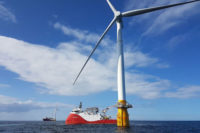Calculating the costs of some project delays requires the use of advanced mathematics but the discipline may not have progressed far enough to measure what’s been lost with the suspension of the New England Clean Energy Connect project.
The $1-billion transmission project was intended to carry hydroelectric power from Canada to New England’s power grid while lowering electricity costs and furthering the state’s plan to meet its aggressive goal of net zero greenhouse gas emissions by 2050. It required a 150-ft-wide corridor through 53 miles of Maine’s verdant forest wilderness.
The project, which received state approvals and started construction, nevertheless was put before voters in 2021 after opponents gained enough signatures in a grassroots petition campaign. They included out-of-state environmental groups, such as the Appalachian Mountain Club (Richard is a member), but also a nuclear power plant operator in New Hampshire and oil and gas firms.
Utilities and other environmentalists supported the project based on its clean energy delivery, but the ballot measure won with a 60% margin. With more than $100 million estimated to have been spent by both sides, it was the costliest ballot measure ever in Maine. says a state ethics group that tracks political spending.
The state supreme court ruled the ballot issue unconstitutional last year—contending the project could not be banned retroactively but sending the issue to a lower court to decide if the developer had done enough physical construction already to prove “vested rights” to continue work.
When a state jury ruled unanimously on April 20 that it had done so, it seemed like the project was finally on its way. But the verdict has not yet triggered work to restart. The project’s developer, Avangrid, says it is sizing up the situation anew, evaluating project economics and remaining challenges, including new lawsuits.
Pressing Reality
We’ve seen these types of battles in the decades since environmental damage and pollution rightfully became a national concern—and they may escalate as states and communities see climate change risks as a more pressing reality and try to attain clean energy and net zero emissions goals.
More solar and wind energy projects are not enough for the U.S. to reach those goals without new transmission projects to connect sources of renewable power to the grid and to consumers. Just like Mainers who supported the referendum, many people could line up against large grid construction projects. The Maine project involved bringing hydropower—bad for rivers, good for climate change—south to New England so that its citizens can use it. That power can be delivered sooner than solar or wind capacity can be built and connected.
The Maine project at first glance seems like an instance of clean energy deliberately delayed until it dies.
But we are in a new age of environmental complexity. Anyone who sees the collision of interests in such conflicts as simple matters of economic development versus environmental preservation, or of good versus evil, is in our view using a playbook written in the 1980s. Such a view misses the difficult policy and public welfare decisions involving local groups against national or regional interests. It misses the multidimensional tensions inherent as we seek to spare vast numbers of people around the planet an as-yet-undefined level of hardship while respecting calls for environmental justice and preserving precious wilderness.
Ticking Clock
To fully implement green energy measures in recent infrastructure funding laws, project permit reform is as important as financial resources±—and the need for Congress to act quickly and responsibly on legislation has never been more urgent.
One measure weighed by the House in its new energy legislation has a two-year time limit for National Environmental Protection Act reviews and sets a 150-day limit for court challenges. It also includes language making it easier for the Federal Energy Regulatory Commission to approve national-interest transmission lines.
But will that help if getting projects on line has as much to do with state and local buy-in as with federal NEPA review, and if House Republicans don’t temper current efforts to cut clean energy programs for political reasons?
Reform has to include enough federal power without destroying needed community participation. We're hopeful our national legislators can negotiate the needed compromises to pass a meaningful and fair permitting measure soon because the clock is ticking on climate change’s worst possible effects.
Richard Korman is deputy editor of ENR, and Debra K. Rubin is ENR energy and business editor







Post a comment to this article
Report Abusive Comment